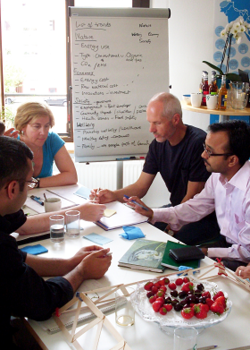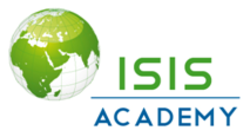
Full house: Hosting the ISIS Academy
"Change agents do nothing but full-speed multi-tasking. They have to be very resilient and aim for changes towards sustainability that last. Change agents also have to be very adaptive and flexible enough to successfully use many different methods. This, in combination with continuous learning enables them to make the desired change.”

Intelligence without ambition is a bird without wings. Yet, the utmost ambition – for example to become a sustainability leader and change agent – is nothing without the right tools at hand. This is why the CSCP was pleased to host the ISIS Academy Master Class in Change for Sustainability in Wuppertal from July 4 to 7, 2012.
The aim of the three-day training event was to “cultivate deeper capacities among today’s sustainability leaders and change agents”. The participants experienced a range of tools for sustainability analysis, learned how to interact with a wide range of stakeholders and how to become a facilitator for change rather than simply a sustainability expert.
Becoming a change agent
As sustainability experts we often approach challenges from our own perspective, we immediately start with giving recommendations to what someone could change. But here it is our ego that is speaking – making us desperate for any change. As a change agent we have to take the time to really understand others by first studying their true needs, and then developing a tailor made solution.
This is what CSCP consultant Ahmad-ur-Rehman Hafiz took as one of his key lessons from the academy. Gabriëlle Rossing, his 'class-mate' and colleague agrees:
Real change agents are human enough. They basically approach others just like good friends do, by letting go of prejudices and adjusting their pace. This is not always easy. It could therefore be very helpful to find the right person to translate your ideas. Doing so shouldn’t be perceived as a failure, it is an art – the art of finding the points of leverage for change.
Spreading skills across nations and disciplines
Next to the Pakistani and Dutch member of the CSCP, an international group of participants from academia, NGOs, business and independent consultants attended the class. In order to become change agents, they explored ways of working with indicators to analyze complex systems, identify where innovation can happen and how to develop strategies for sustainability. The trainers specifically focused on skills like coaching, story-telling, listening and using humour. Through exercises the participants became aware of their personal qualities and how to use them for maximum impact.
Gabrielle was surprised how humour could help:
Change agents in fact structure the jargon jungle for others. A very strong and simple approach here is to share an anecdote. During the Master Class the trainers made us laugh a lot and I realized that using humour and playing with symbols are powerful ways to reach people and anchor ideas.
Being present, talk with others like a good-friend and being able to read the moment and the needs of others, are just some of the characteristics a sustainability leader needs.
For these reasons the CSCP is very pleased to collaborate with the ISIS Academy to train decision-makers and sustainability professionals in systems thinking within a holistic perspective on sustainability to develop creative, tailor-made solutions.
